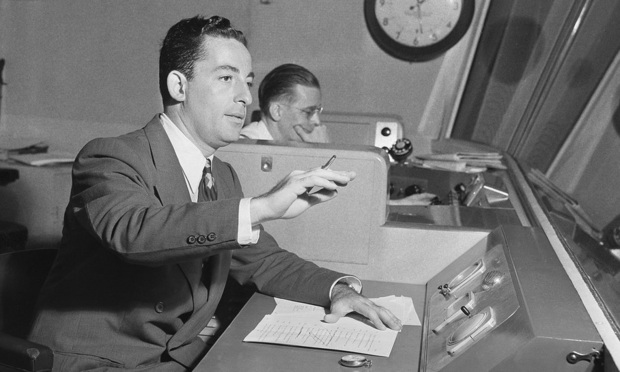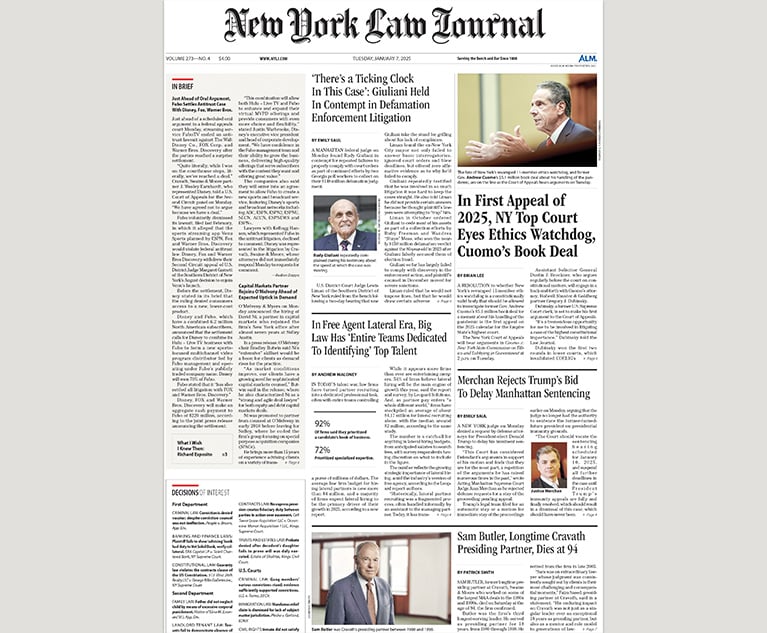Pryor Cashman Partner Must Face Claims He Misled Dying Radio Legend
Radio Drama Network claims the Pryor Cashman partner Richard Kay misled its principal funder into entrusting most of his assets to an entity that Kay controls. A judge has disagreed with most of Kay’s arguments for dismissal.
August 12, 2019 at 04:02 PM
4 minute read
 Himan Brown, foreground, works in a CBS radio studio in New York in 1943. (AP)
Himan Brown, foreground, works in a CBS radio studio in New York in 1943. (AP)
A private foundation set up by prolific radio producer Himan Brown convinced a judge in Manhattan Surrogate’s Court to sustain most of its lawsuit against Pryor Cashman partner Richard Kay over claims that he tricked Brown into adjusting his $100 million estate plan and exploited that control for his personal benefit.
Radio Drama Network, a private foundation set up by Brown in 1984 to promote radio dramas and educational initiatives, accused Kay in 2016 of coaxing an aging Brown into signing most of his $100 million over to the Himan Brown Charitable Trust, of which Kay is the sole trustee. Kay sought dismissal, but Surrogate Nora Anderson largely rejected his motion in a July 15 decision that came about three years after arguments were held.
Radio Drama, which has four board members, including Kay and two of Brown’s relatives, says Kay has used the Charitable Trust to fund his own causes—including his alma mater and the Montessori school attended by one of his grandchildren—rather than its stated purpose, which is to support radio drama or the spoken word.
The court, ruling on a motion to dismiss and a motion for a preliminary injunction, rejected Radio Drama Network’s request to remove Kay from its board and similarly declined to issue an injunction that would have capped disbursements from the Himan Brown Charitable Trust at the legal minimums.
But the court also allowed other claims—including for fraud, undue influence and unjust enrichment—to go forward.
“If petitioner can prove the allegations giving rise to its unjust enrichment claim, the imposition of a constructive trust over the assets of the Charitable Trust may be warranted,” the court said.
Radio Drama claims Kay had Brown, who was 94 years old, sign a “deceptively simple” will that led Brown to believe he was leaving his entire estate to Radio Drama Network. But Brown’s intent was effectively foiled once Kay convinced him to amend the terms of a revocable trust that assured most of the assets he controlled would flow to the Charitable Trust instead.
Brown produced some 30,000 radio shows in his lifetime, according to the Radio Hall of Fame. The Charitable Trust led by Kay held about $97 million as of March 2017, the date of its most recent public tax filing, compared with about $16 million held by Radio Drama as of June 2016. The two entities have different fiscal years, so an apples-to-apples comparison is difficult.
Kay sought dismissal of the suit, arguing that it was time-barred—Brown died in 2010 and most of the contested changes to his estate planning documents were made in 2003 and 2004. Kaye also argued that Radio Drama’s claims “essentially amount to a claim for tortious interference with prospective inheritance, which is not recognized in New York.”
Anderson disagreed with most of Kay’s arguments for dismissal.
Kay, however, won dismissal of a claim for violations of Judiciary Law Section 487, which penalizes attorney deceit. The court rejected Radio Drama’s argument that Kay’s alleged practice of serving notice of probate proceedings upon himself, as a Radio Drama board member, allegedly without alerting other board members, amounted to a Judiciary Law claim. The court said Radio Drama didn’t suffer any harm from not showing up to those proceedings.
And in declining to force Kay from Radio Drama’s board, the court said the board membership dispute was out of its bailiwick, as it was purely a dispute between living persons, and Radio Drama’s proposed fix “would virtually erase the limits on the subject matter this court can adjudicate.”
Michael B. Kramer, a lawyer for Kay who runs his own firm, declined to comment except to say that he and his co-counsel, Gary B. Freidman of Greenfield Stein & Senior, were weighing the prospect of an appeal.
Pamela Mann, a partner at Carter Ledyard & Milburn who represents Radio Drama, said she was not considering an appeal of the parts of the decision that went against her client. But she said she and her client were considering filing a suit in Manhattan Supreme Court to have Kay removed from Radio Drama’s board.
Radio Drama will move forward with discovery “as quickly and vigorously as possible,” Mann said in an interview.
This content has been archived. It is available through our partners, LexisNexis® and Bloomberg Law.
To view this content, please continue to their sites.
Not a Lexis Subscriber?
Subscribe Now
Not a Bloomberg Law Subscriber?
Subscribe Now
NOT FOR REPRINT
© 2025 ALM Global, LLC, All Rights Reserved. Request academic re-use from www.copyright.com. All other uses, submit a request to [email protected]. For more information visit Asset & Logo Licensing.
You Might Like
View All
Sullivan & Cromwell Signals 5-Day RTO Expectation as Law Firms Remain Split on Optimal Attendance
Trending Stories
Who Got The Work
Michael G. Bongiorno, Andrew Scott Dulberg and Elizabeth E. Driscoll from Wilmer Cutler Pickering Hale and Dorr have stepped in to represent Symbotic Inc., an A.I.-enabled technology platform that focuses on increasing supply chain efficiency, and other defendants in a pending shareholder derivative lawsuit. The case, filed Oct. 2 in Massachusetts District Court by the Brown Law Firm on behalf of Stephen Austen, accuses certain officers and directors of misleading investors in regard to Symbotic's potential for margin growth by failing to disclose that the company was not equipped to timely deploy its systems or manage expenses through project delays. The case, assigned to U.S. District Judge Nathaniel M. Gorton, is 1:24-cv-12522, Austen v. Cohen et al.
Who Got The Work
Edmund Polubinski and Marie Killmond of Davis Polk & Wardwell have entered appearances for data platform software development company MongoDB and other defendants in a pending shareholder derivative lawsuit. The action, filed Oct. 7 in New York Southern District Court by the Brown Law Firm, accuses the company's directors and/or officers of falsely expressing confidence in the company’s restructuring of its sales incentive plan and downplaying the severity of decreases in its upfront commitments. The case is 1:24-cv-07594, Roy v. Ittycheria et al.
Who Got The Work
Amy O. Bruchs and Kurt F. Ellison of Michael Best & Friedrich have entered appearances for Epic Systems Corp. in a pending employment discrimination lawsuit. The suit was filed Sept. 7 in Wisconsin Western District Court by Levine Eisberner LLC and Siri & Glimstad on behalf of a project manager who claims that he was wrongfully terminated after applying for a religious exemption to the defendant's COVID-19 vaccine mandate. The case, assigned to U.S. Magistrate Judge Anita Marie Boor, is 3:24-cv-00630, Secker, Nathan v. Epic Systems Corporation.
Who Got The Work
David X. Sullivan, Thomas J. Finn and Gregory A. Hall from McCarter & English have entered appearances for Sunrun Installation Services in a pending civil rights lawsuit. The complaint was filed Sept. 4 in Connecticut District Court by attorney Robert M. Berke on behalf of former employee George Edward Steins, who was arrested and charged with employing an unregistered home improvement salesperson. The complaint alleges that had Sunrun informed the Connecticut Department of Consumer Protection that the plaintiff's employment had ended in 2017 and that he no longer held Sunrun's home improvement contractor license, he would not have been hit with charges, which were dismissed in May 2024. The case, assigned to U.S. District Judge Jeffrey A. Meyer, is 3:24-cv-01423, Steins v. Sunrun, Inc. et al.
Who Got The Work
Greenberg Traurig shareholder Joshua L. Raskin has entered an appearance for boohoo.com UK Ltd. in a pending patent infringement lawsuit. The suit, filed Sept. 3 in Texas Eastern District Court by Rozier Hardt McDonough on behalf of Alto Dynamics, asserts five patents related to an online shopping platform. The case, assigned to U.S. District Judge Rodney Gilstrap, is 2:24-cv-00719, Alto Dynamics, LLC v. boohoo.com UK Limited.
Featured Firms
Law Offices of Gary Martin Hays & Associates, P.C.
(470) 294-1674
Law Offices of Mark E. Salomone
(857) 444-6468
Smith & Hassler
(713) 739-1250









